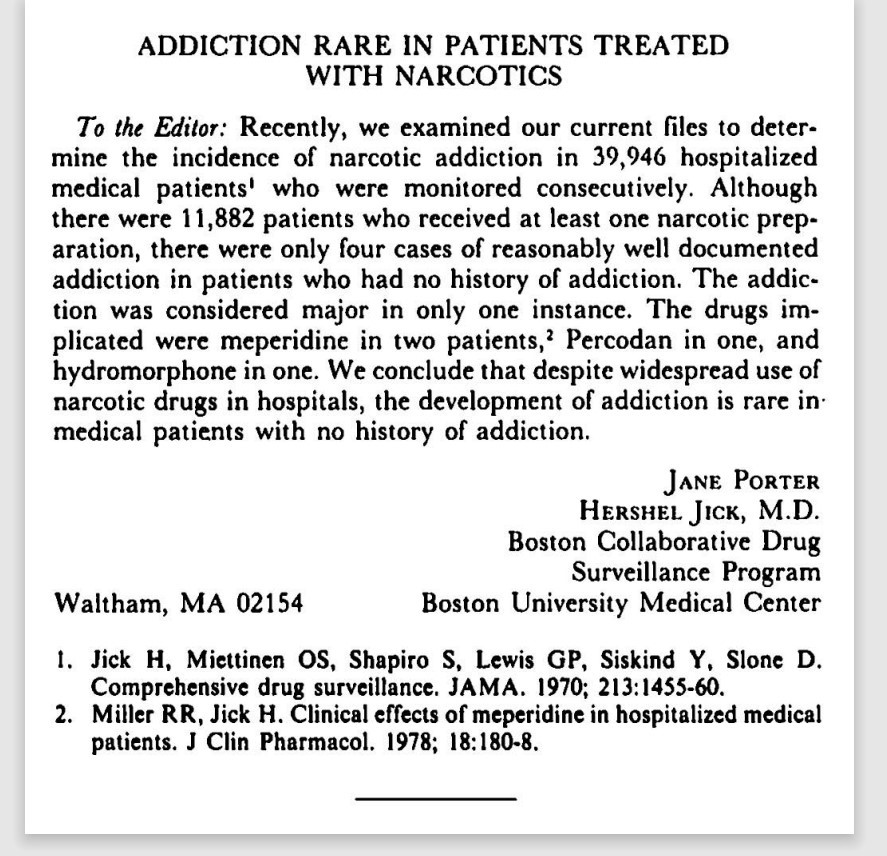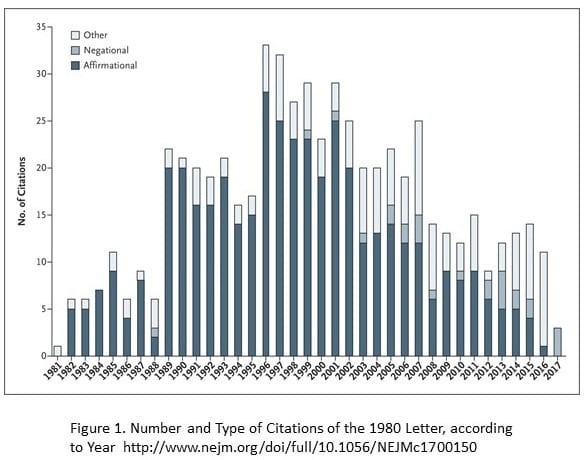Before you read the NPR article, I “will” make a few comments. In no way did the Sacklers not know of the impact of the OxyContin. The sale of it as being non addictive was made up from the get-go of the product. Indeed, one larger than life promotion of OxyContin was done with the misuse of the Jick and Porter letter as taken from The New England Journal of Medicine. In 1980, Doctors Jick and Porter had written a “one-paragraph letter” that was published in the New England Journal of Medicine. It was “widely invoked in support of the claim the use of Opioids does not cause addiction. No evidence was provided by the correspondents using the letter as a citation (see Section 1 in the Supplementary Appendix, at NEJM.org).” The correspondents left
Topics:
Angry Bear considers the following as important: Education, Healthcare, law
This could be interesting, too:
Joel Eissenberg writes No Invading Allies Act
Bill Haskell writes Families Struggle Paying for Child Care While Working
Joel Eissenberg writes Time for Senate Dems to stand up against Trump/Musk
Joel Eissenberg writes RFK Jr. blames the victims
Before you read the NPR article, I “will” make a few comments. In no way did the Sacklers not know of the impact of the OxyContin. The sale of it as being non addictive was made up from the get-go of the product. Indeed, one larger than life promotion of OxyContin was done with the misuse of the Jick and Porter letter as taken from The New England Journal of Medicine.
In 1980, Doctors Jick and Porter had written a “one-paragraph letter” that was published in the New England Journal of Medicine. It was “widely invoked in support of the claim the use of Opioids does not cause addiction. No evidence was provided by the correspondents using the letter as a citation (see Section 1 in the Supplementary Appendix, at NEJM.org).” The correspondents left out the phrase “in hospitals” which defined in what setting were opioids administered.
From a later Post at Angry Bear. Is ‘Big Pharma’ To Blame For the Opioid Crisis? – Angry Bear.
In a later 2017 New England Journal of Medicine citing just how bad the abuse of this brief letter was in comparison to other citations.
A bibliometric analysis was made of this correspondence from its publication until March 30, 2017.
- Identified were 608 citations of the index publication. Noted was a sizable increase of the letter’s use after the introduction of OxyContin (a long-acting formulation of oxycodone) in 1995 (Figure 1).
- Of the articles that included a reference to the 1980 letter, the authors of 439 (72.2%) cited it as evidence that addiction was rare in patients treated with opioids.
- Of the 608 articles, the authors of 491 articles (80.8%) did not note that the patients who were described in the letter were hospitalized at the time they received the prescription.
So was the Jick and Porter letter important? In 1996 Purdue introduced OxyContin. The number of citations increased from 1996 through 2002 and descended till 2017. From 1980 onward till 2015 the letter was cited 5 to 28 (1996) times per year affirming Opioids addition is rare minus the words “hospital setting.”
Back to Purdue, They did not know why the sales of OxyContin increased? No one knew the increasing numbers of deaths was due to Opioids of which OxyContin is one? And we are going to buy this story because they forked some money over to compensate people. Money and a Zoom meeting is not enough.
~~~~~~~~
For the first time, victims of the opioid crisis formally confront the Sackler family, NPR, Brian Mann.
For the first time during the long legal reckoning over the opioid crisis, members of the Sackler family who own Purdue Pharma heard directly from people who say their company’s main product, Oxycontin, wrecked their lives.
David Sackler, Richard Sackler and Theresa Sackler listened and watched during the roughly two-hour long hearing as people described surviving addiction and spoke of losing loved ones to the epidemic.
The Sacklers spoke briefly to confirm their presence, but did not respond to the testimony.
“You created so much loss for so many people,” said Kay Scarpone, whose son Joe Scarpone, a retired Marine, died of an opioid overdose.
“I’m not sure how you live every day. I hope you ask for God’s forgiveness for your actions. May God have mercy on your souls,” Scarpone said.
Many of the people who testified held up photographs of dead loved ones.
“As a physician and a mother, I have been consumed with grief,” said Dr. Kimberly Blake, whose son Sean died of an opioid overdose.
“In 2020, I was hospitalized with depression because I couldn’t face another Mother’s Day without him,” she said.
Roughly 500,000 people in the U.S. have died from opioid overdoses since the opioid crisis began in 1999, including prescription painkillers and street drugs such as heroin and illicit fentanyl, according to the Centers for Disease Control and Prevention.
The virtual hearing was held in federal bankruptcy court at the request of the mediator who hashed out a deal with members of the Sackler family, who are expected to pay roughly $6 billion in exchange for immunity from future opioid lawsuits.
Judge Robert Drain, who presided over the hearing from his court room in White Plains, N.Y., noted that the Sacklers agreed voluntarily to take part.
This was the first and only formal opportunity during Purdue Pharma’s lengthy bankruptcy proceeding for victims to address the company’s owners directly.
Drain cautioned this wasn’t an evidentiary hearing where personal statements should be taken as fact. He also urged those taking part to avoid creating a “denunciation rally.”
But at times, the statements directed at members of the Sackler family were searing.
“I am not a vindictive person, but what you did is criminal,” said Stephanie Lubinski, who lost her husband to an overdose. “You made an insane amount of money off our family, more money than you could ever spend.”
Holding up her husband’s photograph, she said, “You will know his name, Troy Alan Lubinksi.”
The Sacklers do not respond, and offer no apology
David and Theresa Sackler could be seen on-screen during the Zoom session, showing no visible emotion or expression. Richard Sackler was not in view.
Drain has signaled that he expects to approve this bankruptcy deal, after nine states dropped their opposition.
If that happens, the Sacklers will emerge with a clean legal slate, achieving what their attorneys have described as “global peace” from any liability for the opioid crisis.
In the past, the Sackler family has repeatedly voiced “regret” about the impact of Oxycontin, but they have not apologized.
Many of those who survived addiction or lost loved ones voiced rage that members of the Sackler family showed no contrition.
Family members who served on the company’s board and who played a significant role in management decisions have long maintained they did nothing wrong, according to internal Purdue Pharma documents.
The company itself has pleaded guilty to federal crimes twice for its opioid marketing schemes, first in 2007 and again in 2020.
Documents revealed during years of litigation — and as part of a lengthy bankruptcy proceeding for Purdue Pharma — show some members of the Sackler family pushed aggressively to boost prescription opioid sales.
Even as addiction rates and overdoses surged nationwide, the Sacklers employed a consulting firm that promised to help Purdue Pharma “turbocharge” Oxycontin sales.
The Sacklers have denied wrongdoing and faced public backlash
Purdue Pharma’s story isn’t unique. Many of the largest corporations in the U.S. got involved in the opioid business and have paid large sums to settle a wave of lawsuits linked to the crisis.
Late last month, four Fortune 50 companies — AmerisourceBergen, Cardinal Health, Johnson & Johnson and McKesson — agreed to a deal worth roughly $26 billion.
But while executives at those firms have largely remained behind the scenes, the Sacklers have faced an intense personal backlash.
Best-selling books, a TV mini-series, and high-profile magazine articles have portrayed some members of the family as major players in pushing opioid sales.
“I want you to know that the things you have done — and their deadly consequences—have been seen,” addiction activist Ryan Hampton said at the hearing. He survived opioid addiction, which he says began with a prescription for Oxycontin.
Addressing his remarks directly to Richard Sackler, Hampton said, “Your actions will never be forgotten. The world sees you for what you really are.”
The family, once famous for its philanthropic donations, has seen its name stripped from major arts, medical and education institutions.
In public statements and in testimony before Congress in 2020, the Sacklers have described that narrative as inaccurate and unfair.
“The family and the board acted legally and ethically,” David Sackler testified before a House panel.
Many of the family members and addiction survivors who spoke on Thursday also directed comments at Attorney General Merrick Garland, urging him to open a criminal probe into the Sacklers’ alleged role in the opioid crisis.
However, the family has never faced criminal charges, and paid $225 million to resolve the federal government’s civil claims against the family.


